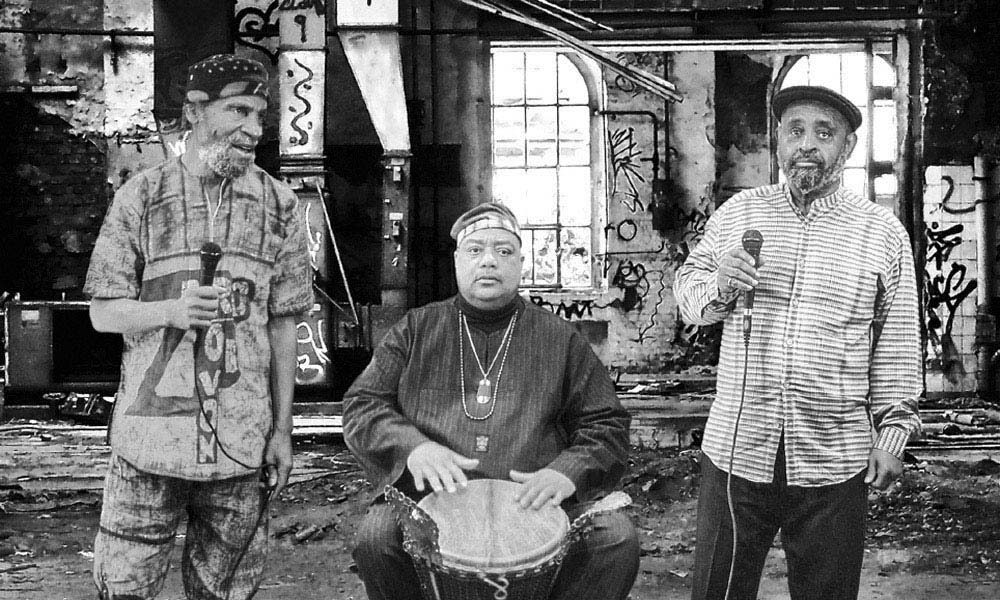Jalal Mansur Nuriddin, The Last Poets’ ‘Grandfather Of Rap’ Dies At 74
As Lightnin’ Rod, Nuriddin also recorded the solo set ‘Hustlers Convention’ which Fab 5 Freddy has dubbed “”a cornerstone in the development of what is now a part of global culture [hip-hop].”

Jalal Mansur Nuriddin (far right in the above photo), whose work in the spoken-word group The Last Poets helped earn him the title of the “Grandfather of Rap,” died on Monday, 4 June. He was 74.
“It is with extreme sadness and a heavy heart that the family of Jalal Nuriddin announce the passing of this great pioneer of the recording industry,” his family said in a statement. “Jalal slipped quietly away this evening into the arms of Allah.” At the time of writing, no cause of death has yet been revealed.
Nuriddin contributed to the Last Poets’ 1970 eponymously-titled debut album as well as the follow-up, This Is Madness. These albums, which paired minimal, driving, percussive accompaniment with emphatic, relentlessly political spoken-word vocals, are widely regarded as crucial early examples of hip-hop.
In 1973, Nuriddin also demonstrated his lyrical dexterity as Lightnin’ Rod on the storytelling solo album Hustlers Convention. Rapper Fab 5 Freddy dubbed Hustlers Convention “a cornerstone in the development of what is now a part of global culture [hip-hop]” in an interview with Noisey. Wu-Tang Clan, Beastie Boys and Red Hot Chili Peppers are among those who have lifted ideas from the record, with veteran producer Ron Saint Germain declaring Hustlers Convention “one of the most stolen and sampled albums ever made.”
“If you were 14 years old and trying to understand the streets, it was sort of like a verbal Bible,” Public Enemy’s Chuck D gushed in a documentary about the album.
Nuriddin, however, had mixed feelings about many of the rappers who came after him. He told Noisey that the music industry forces MCs “to talk nonsense, bitch about their lives, boast about their women, their drugs, their money, their ego – as long as it isn’t relevant to the liberation of the people’s hearts and minds.” He added, “I don’t even think about rap.”
Jalal Mansur Nuriddin was born in Fort Greene, Brooklyn in 1944. The Last Poets formed in the late 1960s and signed to Douglas Records after Jimi Hendrix producer Alan Douglas heard them perform on a basketball court in Harlem – a prelude to what later became the famous block parties associated with DJ Kool Herc, where rap mixed with DJ-ing to coalesce the hip-hop sound originally forged by the Last Poets.
The band had multiple line-ups – to help distinguish ensembles, one group took up the name the Original Last Poets – but Nuriddin was part of the line-up that had the most commercial impact. The Last Poets, released in 1970, peaked at No. 29 on Billboard’s albums chart, selling hundreds of thousands of copies of the lyrically and musically uncompromising LP.
That self-titled first album featured the hit record ‘Niggers Are Scared Of Revolution’ and it established the Last Poets as the artistic vanguard of the civil rights movement, in the wake of the deaths and incarceration of so many of the black activist leaders in America, such as Malcolm X, Martin Luther King and the Black Panthers.
After appearing on the Last Poets’ follow-up, This Is Madness, Nuriddin branched out on Hustlers Convention. The record replaced the sparse instrumentals of the Last Poets with liquid funk from a young Kool & the Gang. “Hustlers Convention is about two characters, who are saving themselves by any means necessary,” Nuriddin told Jamhiphop magazine in 2015. “It wasn’t like they were educated at Harvard, you know? They was already facing discrimination by coming from the ghetto. They had to use their wits without actually breaking the law, because then they would go to jail, and the younger one did go to jail.”
Hustlers Convention would go on to be highly influential, but at the time it was released, it barely sold at all despite its major label sponsors, United Artists, bona fides. In the years since, Nuriddin continued to record intermittently, though he never again achieved the mainstream exposure he enjoyed in the early 1970s. He made a cameo with the Last Poets in the Tupac Shakur-starring film Poetic Justice in 1993.
With The Last Poets, Nuriddin went on to influence some of the biggest names in the music world. In his Miles: The Autobiography, jazz giant Miles Davis wrote: “I used to love poetry, especially the black poets, the Last Poets, LeRoi Jones – Amiri Baraka.” Quincy Jones, meanwhile, later stated in his autobiography: “This mix of elements – what people now label rap – first came on my radar screen in the 1960s, with performers like the Last Poets and Gil Scott-Heron.”
The current iteration of The Last Poets released a new album, Understand What Black Is – their first new album in 20 years – through UK label Studio Rockers on 18 May.












